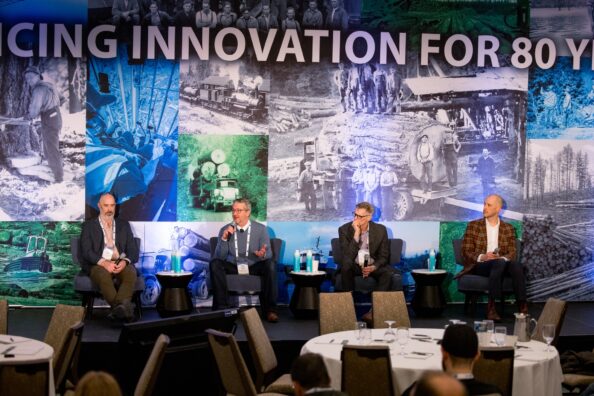At the Truck Loggers Association (TLA) Conference, the panel titled Wildfire and Climate Mitigation Strategies brought together experts to explore proactive solutions for addressing BC’s escalating wildfire risks and advancing climate-conscious forestry practices. Moderated by Vaughn Palmer, the discussion featured John Davies, Senior Wildland Fire Specialist at Forsite Consultants; Jason Fisher, Executive Director of the Forest Enhancement Society of BC; David Greer, Acting Executive Director of the BC Wildfire Service; and Jamie Stephen, Managing Director of TorchLight Bioresources.

Proactive Forest Management — Opening the panel, John Davies discussed the increasing intensity and frequency of wildfires, highlighting their link to evolving climatic conditions. Drawing on decades of wildland fire experience, Davies emphasized the importance of integrating wildfire risk assessments into long-term forestry planning. “Managing forests with fire in mind isn’t just about prevention; it’s about resilience,” he said.
Davies advocated for proactive measures such as prescribed burns, mechanical thinning, and the creation of strategic fuel breaks. He explained that these practices not only reduce wildfire severity but also contribute to overall forest health and biodiversity. Davies reflected on case studies, such as fuel management projects in high-risk areas, which have demonstrated the effectiveness of these strategies. “We need to shift from reactive firefighting to proactive mitigation,” he urged.
Davies also emphasized the importance of collaboration between forestry professionals, government agencies, and local communities. He pointed out that public education plays a vital role in gaining support for prescribed burns and other mitigation efforts. Additionally, Davies highlighted the need for consistent funding to scale up proactive forest management efforts, noting that larger-scale projects are crucial to addressing BC’s wildfire risks effectively.
Restoring Forest Resilience — Jason Fisher brought a community-centered perspective, focusing on forest enhancement initiatives aimed at mitigating wildfire risks and fostering ecological resilience. As Executive Director of the Forest Enhancement Society of BC (FESBC), Fisher outlined how their programs address hazardous fuel loads, restore forest health, and create wildlife habitats.
Fisher highlighted successful partnerships with Indigenous communities, emphasizing the integration of traditional ecological knowledge into forest management. “Indigenous collaboration is essential for sustainable stewardship,” he said, showcasing examples of co-led projects that have significantly reduced wildfire risks while respecting cultural values.
Fisher also discussed the role of FESBC in supporting longer-term, landscape-level projects. He emphasized the need for ongoing funding to maximize the impact of wildfire risk reduction efforts and highlighted the economic benefits of these initiatives, such as job creation in rural areas and opportunities for biomass utilization. “Investing in forest enhancement yields benefits for both the environment and local economies,” Fisher noted.
Adapting to a New Fire Reality — David Greer provided insights from the BC Wildfire Service, discussing how wildfire management has evolved to meet the challenges of longer fire seasons and more extreme fire behavior. “Wildfire management is no longer a seasonal task; it’s a year-round commitment,” Greer stated.
Greer highlighted recent advancements in operational strategies, such as risk-sharing partnerships with municipalities, First Nations, and industry stakeholders to improve response coordination. He also noted the importance of innovative tools, including remote sensing and fire prediction models, in enhancing wildfire response capabilities.
A key focus of Greer’s remarks was fostering a culture of shared responsibility. “Wildfires affect everyone, and it’s imperative that we work together to manage the risks,” he said. Greer emphasized the success of FireSmart initiatives in BC communities, which have significantly improved preparedness and resilience to wildfire threats. He also touched on the mental health challenges faced by wildfire response teams and advocated for increased support to address these growing demands.
Unlocking Bioenergy’s Potential — Jamie Stephen explored the role of bioenergy in mitigating wildfire risks and supporting climate goals. As Managing Director of TorchLight Bioresources, Stephen emphasized the importance of utilizing forest biomass as a renewable energy source. “Bioenergy is a win-win: it reduces carbon emissions while creating economic opportunities in rural communities,” he explained.
Stephen highlighted how converting excess wood and forest residues into bioenergy can help reduce hazardous fuel loads, aligning with wildfire mitigation efforts. He advocated for policies that incentivize bioenergy adoption, such as carbon pricing mechanisms and subsidies for bioenergy facilities. “BC’s abundant forest resources position it as a leader in the bioenergy sector,” he added.
Stephen also drew on international examples, particularly from Scandinavia, to illustrate how bioenergy can reduce reliance on fossil fuels and support broader decarbonization goals. He emphasized the potential for bioenergy to foster new industries in forestry-dependent regions, helping these communities transition to low-carbon economies while creating sustainable jobs.
Drafted with the assistance of digital tools to streamline the process.